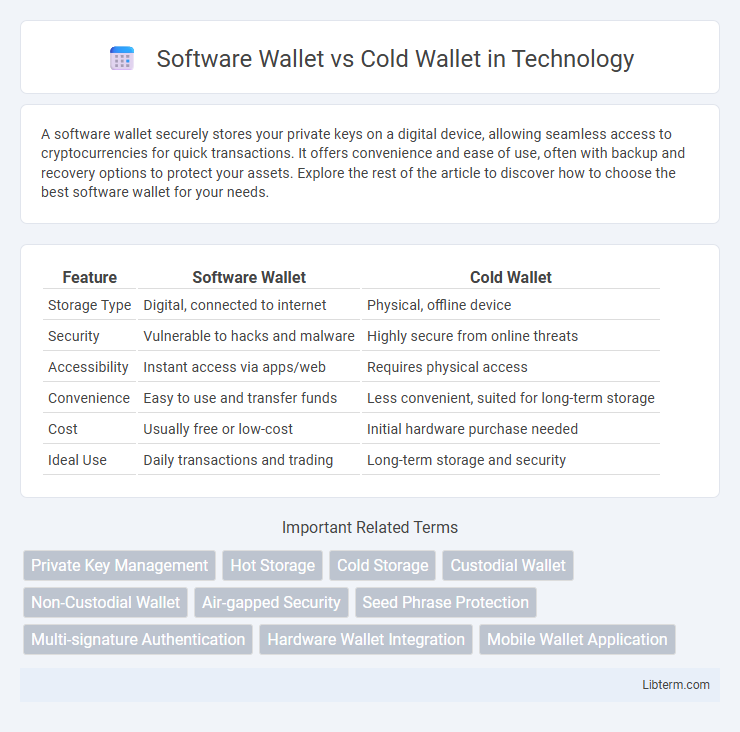A software wallet securely stores your private keys on a digital device, allowing seamless access to cryptocurrencies for quick transactions. It offers convenience and ease of use, often with backup and recovery options to protect your assets. Explore the rest of the article to discover how to choose the best software wallet for your needs.
Table of Comparison
| Feature | Software Wallet | Cold Wallet |
|---|---|---|
| Storage Type | Digital, connected to internet | Physical, offline device |
| Security | Vulnerable to hacks and malware | Highly secure from online threats |
| Accessibility | Instant access via apps/web | Requires physical access |
| Convenience | Easy to use and transfer funds | Less convenient, suited for long-term storage |
| Cost | Usually free or low-cost | Initial hardware purchase needed |
| Ideal Use | Daily transactions and trading | Long-term storage and security |
Introduction to Digital Wallets
Digital wallets enable secure storage and management of cryptocurrencies and digital assets, with software wallets operating online for convenient access and transactions, while cold wallets store assets offline to minimize hacking risks. Software wallets include mobile, desktop, and web versions, offering user-friendly interfaces and instant connectivity to blockchain networks. Cold wallets, such as hardware devices or paper keys, provide enhanced security by isolating private keys from internet exposure, ideal for long-term storage.
What is a Software Wallet?
A software wallet is a digital application that stores private keys on a device connected to the internet, enabling quick and convenient access to cryptocurrencies for transactions and management. It supports multiple platforms, including mobile, desktop, and web, offering features such as real-time balance updates and integration with exchanges. Security relies on encryption and password protection, but software wallets are more vulnerable to hacking compared to offline cold wallets.
What is a Cold Wallet?
A cold wallet is a type of cryptocurrency storage that keeps private keys offline, significantly reducing the risk of hacking and unauthorized access. Unlike software wallets that are connected to the internet, cold wallets include hardware wallets, paper wallets, and other offline methods designed for long-term, secure storage. Cold wallets are essential for safeguarding large amounts of digital assets by ensuring keys remain completely isolated from online threats.
Key Differences between Software and Cold Wallets
Software wallets store private keys online or on connected devices, enabling quick access and ease of use for frequent transactions but are more vulnerable to hacking and malware attacks. Cold wallets, also called hardware or offline wallets, keep private keys stored offline on physical devices, dramatically reducing exposure to cyber threats and providing superior security for long-term cryptocurrency storage. The key difference lies in accessibility and security: software wallets favor convenience and speed, while cold wallets prioritize protection and offline storage.
Security Features Comparison
Software wallets offer ease of access and frequent updates but are vulnerable to malware and phishing attacks due to their internet connectivity. Cold wallets, such as hardware or paper wallets, provide enhanced security by storing private keys offline, significantly reducing the risk of hacking and unauthorized access. Encryption, multi-factor authentication, and backup options further strengthen cold wallets' protection compared to software wallets.
Accessibility and Convenience
Software wallets provide enhanced accessibility with instant access via internet-connected devices, making them ideal for frequent transactions and everyday use. Cold wallets, stored offline on hardware devices or paper, offer superior security but require physical access, limiting convenience for regular trading. Balancing ease of use and protection, software wallets prioritize user-friendly interfaces, while cold wallets focus on safeguarding digital assets from online threats.
User Experience and Interface
Software wallets offer intuitive interfaces with seamless access to cryptocurrencies via mobile or desktop apps, providing real-time transaction tracking and easy backup options. Cold wallets prioritize security by storing private keys offline, but their user experience often involves manual setup steps and physical device handling, which can be less convenient for daily use. The trade-off between usability and security defines the choice, where software wallets excel in accessibility, while cold wallets safeguard assets with enhanced protection despite a less streamlined interface.
Cost and Maintenance Considerations
Software wallets typically incur lower upfront costs since they are often free or low-priced applications but require regular updates and security monitoring to prevent cyber threats. Cold wallets, such as hardware wallets, involve higher initial investment costs but demand minimal maintenance, offering enhanced protection against online hacks by storing private keys offline. Evaluating cost-effectiveness balances the ongoing maintenance expenses of software wallets with the one-time purchase and durability of cold wallets.
Which Wallet is Best for You?
Choosing between a software wallet and a cold wallet depends on your security needs and convenience preferences. Software wallets offer easy access and are ideal for frequent transactions but carry higher risks of hacking due to their internet connection. Cold wallets provide enhanced security by storing cryptocurrencies offline, making them best for long-term holdings and protection against cyber threats.
Conclusion: Making the Right Choice
Choosing between a software wallet and a cold wallet depends on the balance between convenience and security. Software wallets offer easy access and user-friendly interfaces ideal for frequent transactions, while cold wallets provide enhanced protection through offline storage, minimizing hacking risks. Prioritize cold wallets for long-term crypto holdings and software wallets for active trading to optimize asset safety and accessibility.
Software Wallet Infographic

 libterm.com
libterm.com